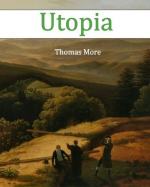|
This section contains 8,942 words (approx. 30 pages at 300 words per page) |

|
SOURCE: "More's Place in 'No Place': The Self-Fashioning Transaction in Utopia," in Texas Studies in Literature and Language, Vol. XXXIV, No. 2, Summer, 1992, pp. 197-217.
Freeman interprets the Utopia as an autobiographical text in the essay that follows, finding in it an expression of More's "desire to strike a proper balance between what is private and what is public."
Baker on the translation of More's Utopia:
Sixteenth-century translators in particular could exercise a good deal of latitude in their interpretations of texts. The second English translator of Utopia, Gilbert Burnet, wrote in 1684 that he initially suspected More himself of having been the first translator of Utopia because that first "[t]ranslator has taken a liberty that seems too great for any but the author himself, who is Master of his own Book." Indeed, in the Confutation of Tyndale's Answer (1532), More at least anticipated one form that such "liberty" might...
|
This section contains 8,942 words (approx. 30 pages at 300 words per page) |

|


